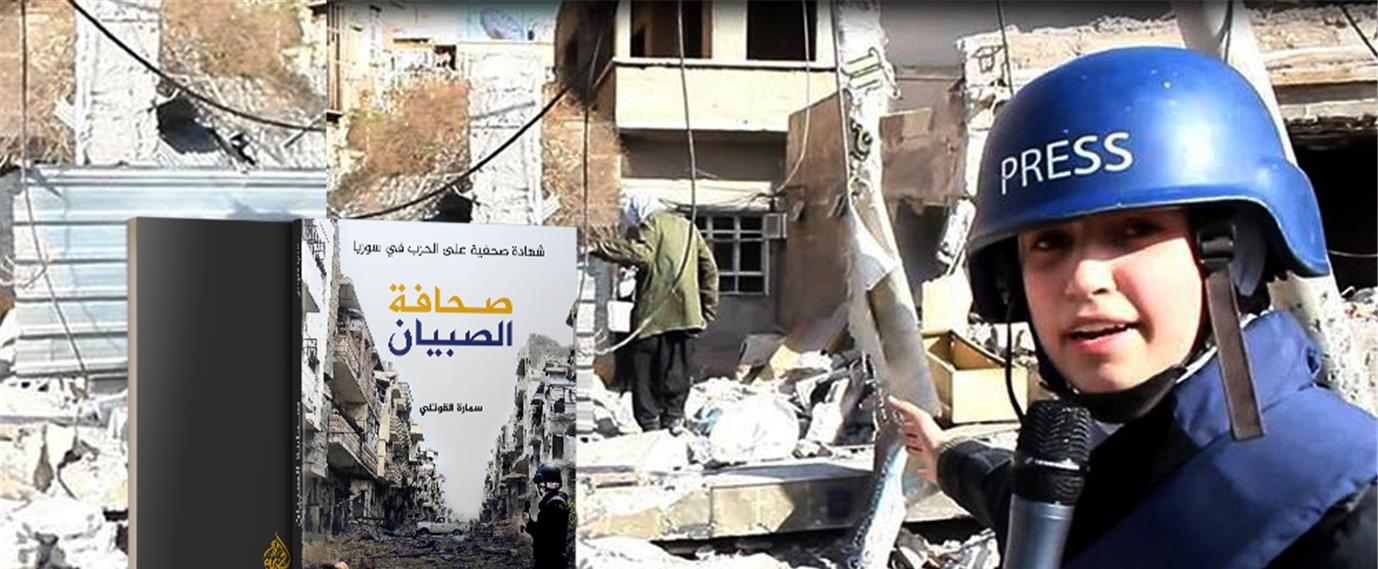الاسم الذي كان من الممكن أن يكون أي شيءٍ، صار- مصادفة- سمارة بدَل سمرا، ولقبُ العائلةِ جاء حاملاً كل ما كان من ذاكرةِ الطفولةٍ لصبيَّةٍ سكَنَت –مصادفةً أيضاً- مع عائلتها في شارع القوتلي وقذَفَتها الأحداثُ في قلبِ جولاتِ أحدِ أشرس الميادين التي خاضها الصحفيون –عبر التاريخ الحديث- للحصول على المعلومة، سمارة القوتلي هو الاسم المزوَّر لحياةٍ غير مزوَّرة، وثَّقتها شهادةٌ صحفيةٌ على الحرب في سوريا بكتابٍ صادرٍعن معهد الجزيرة للإعلام تحت عنوان "صحافة الصبيان".
غالباً ما تكون قصص الصحفيين أو المصورين الصحفيين العاملين أو أولئك الذين اشتغلوا في مناطق تشهد اضطرابات أو صراعات مسلَّحة، تكون متشابهة في مساراتها بذهن المتلقي البعيد عن شجون هذه المهنة، إنها قصص تقف في مواجهةٍ مع الموت وتسكن فيه مرَّات كثيرة، نلمس ذلك واضحاً في كتابات الصحفية البيلاروسية "سفيتلانا ألكسفيتش" الحائزة على جائزة نوبل للآداب باعتبارها المؤسس لما بات يُعرَف لاحقاً بـ"الرواية الريبورتاج". هذا النموذج من الكتابة الذي بدأ بفرض نفسه على تلك المساحة التي تُراوِحُ بين الأدب والصحافة، فهو قائمٌ في جوهره على سرد القصة الأدبية بأدوات الكتابة الصحفية، وهذا ما أراد معهد الجزيرة للصحافة تقديمه عبر تدوين تجارب مراسلي وصحفيي شبكة الجزيرة، فبدأت الحكاية مع كتاب "الصحافة في زمن الحرب"، لتأتي الخطوة الثانية تحت عنوان "صحافة الصبيان"، حيث تضع سمارة القوتلي القارئ- مهما كان اختصاصه- أمام تجربة حقيقية امتلكت صاحبتها الجرأة على روايتها بوقتٍ مبكر عبر فصول اختارت لها عناوين فرعية، فكانت "ومضات" تسير على هامش الحدث بوصفها حياة مجهولة لفتاة كان من الممكن بحسابات المنطق أن تكون رقماً لضحية في مجزرة.
أتوقف مع إهداء الكتاب في عتبة النص.. هذا الإهداء يضعنا أمام مسارات الحكايات المتشعِّبة، إنه ليس جملَتَين قصيرتين فقط، بل اختصارا لحياتَين اثنتَين متجاوِرَتَين ومتطابقتَين في الخسارات، لتبدأ الكاتبة السردَ في المتن مع أشياء جامدة فتبني حوارات مع الحاسوب، الزيتون، القهوة، شجرة الليمون، و تنتقل برشاقة من ضمير المتكلم إلى ضمير الجمع "صورت المظاهرة، صعدت الجبل المرتفع، تسلقنا القمم لنصور المقابر والمشاهد الخلابة". سوريا هنا حاضرة في كل تفصيل، إنها ليست اقتصاراً على الوطن، بل الصورة المشتهاة لمجموعة من الصور المتحولة تبعاً لحامل السلاح، فالمكان في " صحافة الصبيان" مرتبط بالتفاصيل، أقتصر هنا مثلاً على الحوار مع شجرة الليمون في بيت الجد، أما الزمان فهو مقسوم إلى فصلَين في المستوى العام، الأول "مطرٌ يشوش على جناحي الطائرة، وصيفٌ يطلق عنان "الميغ" و" السوخوي" في السماء"، كما ورد في الإصدار.
تحاول سمارة القوتلي أن تضع القارئ في جغرافية السرد فتحكي عن مدينتها، إنها ذلك الرحم الواسع الذي احتضن وجوهاً مختلفة كما ورد في الكتاب.. "نعيش جميعاً في مدينة مزدحمة من أكبر مدن غوطة دمشق، كان يقطنها يوماً قرابة مليون إنسان، من بيننا فلسطنيون وعراقيون ولاجئون نؤثرهم على أنفسنا، ودمشقيون قدامى من كل المدائن هربوا من غلاء أسعار بيوتهم حين تزنَّرت العاصمة بالغرباء، نرى أن الصواب في ما يفعله الآخرون، وما نفعله في الخفاء عن أعين بعضنا هو الخطأ".. "تقلص عددنا بعد الحرب إلى الربع، لكننا بقينا نتزوج من بعضنا، نكره بعضنا، نخشى بعضنا، وجميعنا نُقتل دفعة واحدة للسبب ذاته، لا ندمن موتنا، لا نرحم بعضنا، نحفر لإخوتنا حفراً ونقع فيها معاً، لا نحب أحداً، ولا نموت".
الكاتبة التي قادتها الأقدار نحو العمل الصحفي تروي في "صحافة الصبيان" ما حدث معها بحياد مرة وبانحياز مرة أخرى؛ فالموقف الانفعالي بدا واضحاً في عملية السرد على اختلاف المدن والجغرافيا، فتحاول أن تبني صوراً مع المتلقي لتقرِّب المشهد عن واقع العمل الصحفي في سوريا، تقول مثلاً: "حدث مرة أن اقترح عليّ فصيل عسكري ذات مرة أن يتركني عساكره دون معوقات ومذكرات اعتقال، ودون تضييق دائرة عملي، شرط أن يدققوا لي جمل التقرير ويعيدوا ترتيب مونتاجه حسب منتوجاتهم التي يريدون إبرازها، هم كانوا ينظرون إلى الكاميرا بتعال وعنجهية يوهم بهما السلاح الناري أصحابه، ويعتبرون أصحابها مجرد صبيان"، أيضاً هنا يمكن الإشارة إلى الحوار الذي حدث في الومضة الثالثة من الكتاب تحت عنوان "مداهمة لأصول التحرير الصحفي" بين أدهم و فداء حول عدد القتلى والرغبة في رفع العدد من ثلاثة قتلى إلى خمسة كي يكون للخبر وقع آخر على المتلقي، فالكتاب يقدِّم المشهد من بُعدَين اثنين، الأول خارج دائرة العمل الصحفي والثاني من الداخل، وبينهما تنتقل الكاتبة من الهامش إلى المركز ومن المركز إلى الهامش بحركات السرد الدائري، المبني في أصله على ضمير المتكلم أو الأنا الذاتية التي تحمل انفعالات واضحة تضفي صدقية على النص، تقول الكاتبة:" أكتب هذه الكلمات وأنا على قيد الحياة، حاولت أن أحمي نفسي حتى لا أكمل عمري في زنزانة، وكأن التهديد والحذر يسجناني أكثر من جدران السجن، توقفت عن إذاعة الأخبار كما تعرفون، وقوف العاجزين، ما كان بإمكاني أن أرسل خبراً ما وأخشى في الوقت ذاته على نفسي حتى وصلت إلى تقرير الصفر، وهو آخر ما صنعت يدي".
النهاية في " صحافة الصبيان" جاءت كالبداية في النص المفتوح على الموت بين الومضة الأولى والومضة الرابعة، فذلك الحوار بين الأشياء الجامدة تحوَّل في جغرافية جديدة إلى حوار بين الأرواح، بين طيفٍ لخيال فتاة وردية تخرج من البحر وشخصية المراسلة التي أفرغت أغلبَ ما في جعبتها على الورق، إنها الروح الهاربةُ بجسد طفولي لتواجه كل ماحدث مرةً واحدة.
نحن هنا أمام تجربةٍ من لحمٍ ودم جاءت على شكل ومضات تشبه لقطات في فيلم سينمائي عشوائي ومعقَّد التركيب، لكن تبقى الرواية الموازية لتفريغ وكتابة هذه المذكرات خطّاً يستحق التوقف عنده، وبمعنى أدق يستحقُّ روايته صورياً لتحكي انفعالات التذكُّر واستحضار مَن رحَل ومَن بقيَ ومَن بدَّل كشهادةٍ على كتف الحقيقة للصحفي الإنسان القادر على مواجهة انفعالاته الذاتية وحاضره المشحون بكل ما مضى من تراجيديا وكوميديا في آنٍ واحد.
لتحميل النسخة الإلكترونية من الكتاب، الرجاء الضغط على الأيقونة يسار أعلى الصفحة.












































